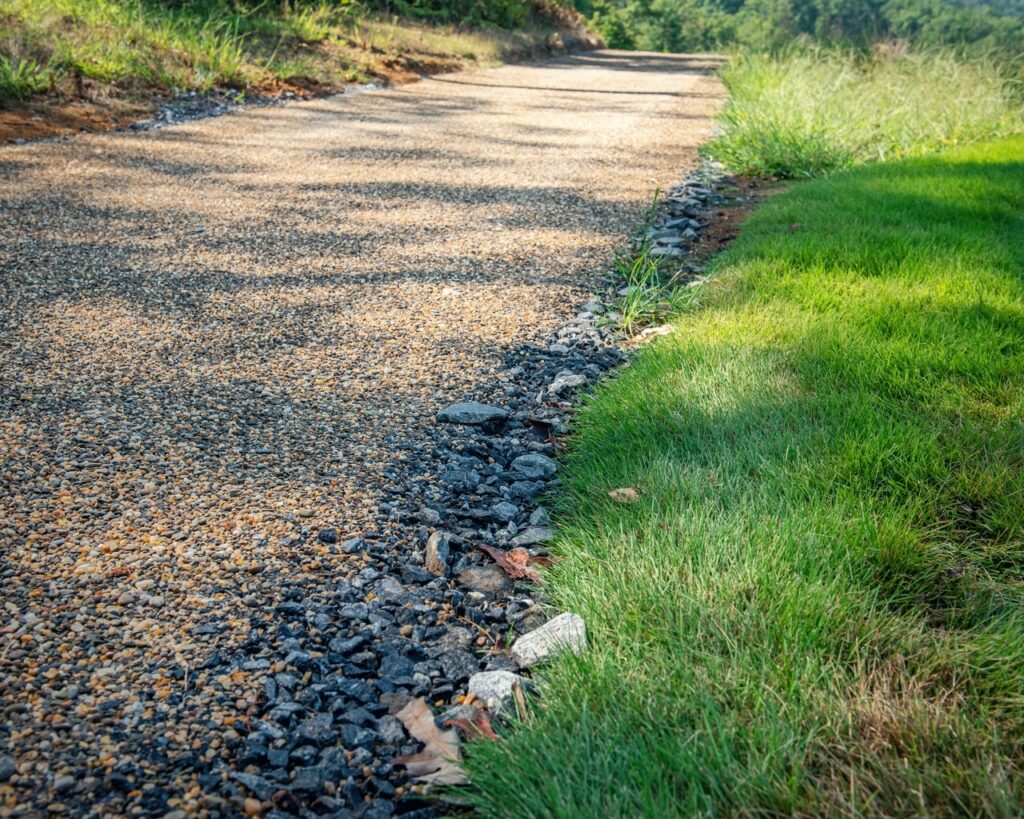If you’ve been dealing with a gravel driveway on your property, you may have wondered if it’s worth the investment to upgrade it to a more durable and aesthetically appealing surface. Both asphalt and tar & chip (also known as chip seal) are popular choices for upgrading gravel driveways, offering unique benefits that might align with your needs and preferences. In this blog post, we’ll explore the advantages of each option, address common pain points associated with gravel driveways, and help you decide which upgrade could be the best fit for your home.
The Pain Points of Gravel Driveways
Before diving into the benefits of upgrading to asphalt or tar & chip, let’s address the pain points commonly experienced with gravel driveways:
- Dust and Mud: Gravel driveways tend to generate dust during dry weather and mud during rainy days, creating a messy and unpleasant experience for homeowners and visitors alike.
- Maintenance: Gravel requires regular maintenance, including grading, filling potholes, and replenishing lost gravel, which can be time-consuming and expensive.
- Limited Aesthetics: Gravel driveways may not offer the polished and neat appearance that other surfacing options like asphalt or tar & chip can provide.
- Maintenance: Maintenance for gravel driveways can be a continuous process, demanding regular attention to keep the surface in good condition.
- Grading: Gravel driveways require periodic grading to even out the surface, as the stones tend to shift and create uneven areas due to vehicle traffic and weather conditions.
- Filling Potholes: Potholes can develop in gravel driveways over time, necessitating the filling of these depressions to prevent further damage and potential safety hazards.
- Weed Control: Gravel driveways can be prone to weed growth, which requires ongoing maintenance to keep the driveway looking clean and tidy.
- Replenishing Gravel: The gravel surface may wear down with use, leading to the need for regular replenishment to maintain the desired thickness and functionality.
Asphalt Driveways: Advantages and Considerations
Asphalt driveways are a popular choice for homeowners seeking a smooth and durable surface. Here are some advantages:
- Durability: Asphalt surfaces can withstand heavy traffic, making them suitable for both residential and commercial properties.
- Improved Aesthetics: An asphalt driveway can enhance the curb appeal of your property, adding value to your home.
- Quick Installation: Asphalt can be laid relatively quickly, minimizing disruption to your daily routine.
- Maintenance: Asphalt driveways generally require less maintenance compared to gravel surfaces, but some key aspects should be addressed to extend their lifespan and appearance.
- Sealcoating: To protect the asphalt surface from the elements and prevent cracks and deterioration, periodic sealcoating is recommended. This process typically needs to be done every few years, depending on the climate and wear.
- Crack Repair: Over time, small cracks may appear on the asphalt surface due to temperature changes or heavy loads. Prompt repair of these cracks is crucial to prevent them from spreading and causing more extensive damage.
- Cleaning: Regularly cleaning the asphalt surface from debris, oil spills, and other contaminants helps maintain its appearance and prevents surface degradation.
However, it’s essential to consider the climate in your area. In extremely hot climates, asphalt may become soft in high temperatures, potentially causing tire marks and surface deformation.
Tar & Chip (Chip Seal) Driveways: Advantages and Considerations
Tar & chip is an excellent alternative to traditional asphalt. It consists of a layer of hot liquid asphalt, followed by a layer of stones or chips. Here are its advantages:
- Cost-Effective: Tar & chip is generally more affordable than asphalt, making it an attractive option for budget-conscious homeowners.
- Aesthetically Pleasing: With various chip colors and sizes available, tar & chip can be customized to complement your property’s aesthetics.
- Improved Traction: The textured surface of tar & chip provides better traction, reducing the risk of slipping during wet or icy conditions.
- Maintenance: Chip seal driveways offer a middle ground between gravel and asphalt in terms of maintenance requirements. They are relatively low-maintenance, but some upkeep is necessary for optimal performance.
- Resealing: Like asphalt, chip seal driveways benefit from periodic resealing to protect the surface and maintain its durability. Resealing may be required every 5 to 7 years, depending on the wear and tear.
- Sweeping: Regular sweeping helps keep the surface clean and prevents the buildup of debris and vegetation.
- Chip Replacement: Over time, some chips may loosen or dislodge due to heavy use or extreme weather. Replacing these chips as needed ensures a consistent and level surface.
Nonetheless, it’s essential to consider that tar & chip may not be as smooth as asphalt, and the surface may not be as durable, especially under heavy traffic.
Conclusion
Upgrading your gravel driveway to either asphalt or tar & chip can significantly improve your property’s appearance and functionality while addressing the pain points associated with gravel surfaces. If you prioritize durability, smoothness, and a polished look, asphalt may be the better choice. On the other hand, if you’re looking for a cost-effective yet visually appealing option with improved traction, tar & chip could be the ideal fit.
Ultimately, the decision depends on your specific needs, budget, and preferences. Consulting with a professional asphalt paving company like Uniform Paving & Sealcoating can help you make an informed choice based on your unique situation. Remember that both options provide significant benefits over a traditional gravel driveway and can add value to your property in the long run. Contact us today to see how we can upgrade your driveway or path!
